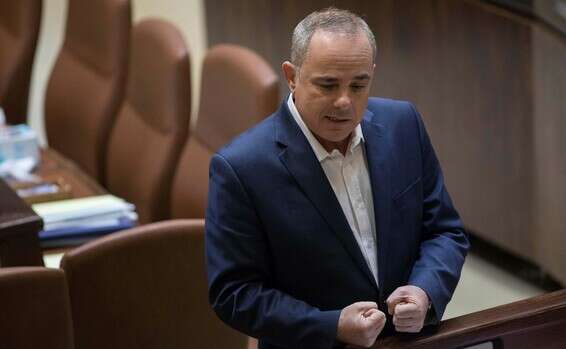Energy Minister Steinitz referred to the emerging negotiations between the countries on maritime borders, after eight years of disagreement • "It is possible to move forward quickly"
"The Lebanese have realized that they are being left behind."
Minister Yuval Steinitz
Photography:
Noam Rybkin Fenton
"If the Lebanese want it, we can move forward quickly."
This is what Energy Minister Yuval Steinitz told Israel Today today (Thursday), following the agreements between Israel and Lebanon to open negotiations to resolve the dispute between them over the maritime border between the two countries.
According to Steinitz, "on average, this is a dispute of only six kilometers, the dispute is not over a large area."
Talks between Israel and Lebanon are expected to open in the coming weeks and take place on the Lebanese side of the border, about 20 meters from the border gate in Rosh Hanikra.
"It will be the first time since the first Lebanon war (which began in 1982) that Israeli and Lebanese representatives will sit opposite each other," says Steinitz.
"Israel Today" has learned that in the preliminary talks led by the American mediator David Shenkar, the two countries transferred to each other commitments that they undertook to keep secret.
Among other things, Israel demanded that the United States be the sole mediator between the parties and not the UN or other countries.
On the other hand, the Lebanese demanded the mediation of the UN and therefore it was agreed that the meetings would take place at the UN facility in Nakura.
Two years ago, the security cabinet instructed Steinitz to lead the opening of talks between Israel and Lebanon on the maritime border.
A large team, led by representatives of the Ministries of Foreign Affairs, Energy and Justice, as well as the National Security Council and other bodies, led the process and defined Israeli interests.
Photo: IDF Spokesman
Steinitz now says, "The Lebanese have realized that they are lagging behind. They are in a severe economic crisis even before the explosion in the port of Beirut, and are unable to properly develop their potential gas fields because companies are reluctant to operate in disputed areas. ", Reduces air pollution by 60 percent, establishes an international regional energy forum and sells billions of gas to Jordan and Egypt. For these two reasons, I think they got on the bandwagon."
Steinitz adds that if and when the talks end in a maritime border agreement, both Israel and Lebanon will be able to develop additional gas fields that are in their economic waters, after eight years of controversy.

